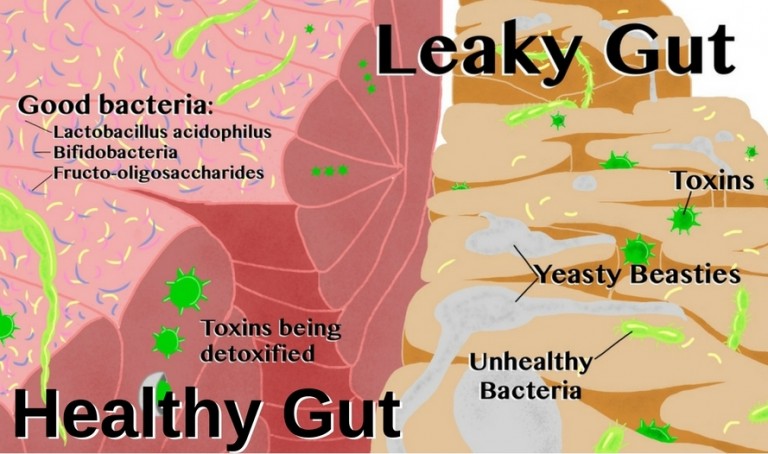Do you have the following symptoms or habits?
- Gas, bloating, abdominal pain (often misidentified as “lactose intolerance”)
- Alternating constipation and diarrhea
- Chemical sensitivity and food allergies
- General fatigue, anxiety or depression
- Focus issues
- Joint pain
- Chronic headaches, including migraines
Do you engage in some of these habits?
- Regular use of over-the-counter pain medications (NSAIDS: non-steroidal anti-inflammatories such as Motrin, Aleve, etc.) or steroid use (prednisone, cortef, etc.).
- Antibiotic use, especially two or more courses back-to-back or chronic long-term use, such as for acne or recurrent sinus infections.
- Chronic under-consumption of protein.
These are some common causes and symptoms of a condition called intestinal permeability, or “leaky gut,” an under-recognized but increasingly common problem.
What is leaky gut?
“Leaky gut” refers to increased permeability of the gut wall, specifically in the small intestine. The membrane of the small intestine is meant to be impermeable. When spaces develop between the cells of the small intestinal wall, it becomes permeable and allows toxins, pathogens, and food proteins to leak into the blood stream. This can result in hidden food and environmental allergies, systemic inflammation, and a steady decline in health.
We can help you identify whether you have leaky gut using a simple urine test.
How does the gut become leaky?
A major cause is antibiotics. When you take antibiotics, they destroy not only the targeted bacteria but also the healthy bacteria that live in the intestines. With beneficial bacteria and other protective factors eradicated, unfriendly bacteria, yeast, parasites and toxins can accumulate, damaging the intestinal wall. This harmful effect can be mitigated by taking probiotics while on an antibiotic.
The second major cause of leaky gut is regular use of non-steroidal anti-inflammatory (NSAIDs) medications such as Motrin, Aleve, Advil, ibuprofen, etc. These medications contribute to the breakdown of the physical integrity of the intestinal wall. Steroids, like prednisone, have a similar, more drastic, effect.
Another source of inflammation and breakdown of the gut lining can be food or water poisoning from organisms such as giardiasis, helibactor, klebsiella and others. Sometimes there are no obvious signs of an infection, yet the gut lining becomes increasingly damaged until symptoms manifest. These can include bloating, gas, acid reflux, cramping, diarrhea and constipation. These are all the symptoms seen in those with IBS, especially IBS-D (chronic diarrhea).
Low vitamin D levels can also affect the integrity of the gut membrane. It acts as a “guardian” of the cellular spaces and if low can allow the breakdown of the cell membranes. Check to see if your vitamin D levels are within optimal range through a blood test that you an get through us or your doctor.
Stress, both chronic and acute, also plays a role in creating intestinal permeability. Stress can take many forms, including mental (overloaded at work), emotional (going through a breakup or loss), and physical (lack of sleep, hard work out). All of these stressors impact cortisol levels. Increased cortisol affects your digestion, gut motility, and your immune system. In fact, about 80% of your immune system is located in your GI tract and high levels of cortisol can increase your immune response(Secretory IgA) , thereby increasing inflammation. The more inflamed your enterocytes, or cells that line your small intestines are, the more they swell and a gap can form between the cells (see diagram). This is the mechanism by which chronic stress can lead to chronic inflammation in the Gi tract, which then contributes to leaky gut and inflammatory conditions.
What happens in leaky gut?
Once the integrity of the gut wall is compromised, food proteins can penetrate the barrier and enter the bloodstream, where they form a class of antibodies called IgG. This type of antibody manifests as chronic and delayed reactions that can occur up to 72 hours after the food is ingested. For this reason, they are considered a “hidden food allergy.” The reaction is systemic, such as headaches, brain fog, fatigue, mood disorders, joint pain, and a chronic elevated baseline of inflammation. This makes them very hard to track. These types of food reactions can be identified through IGG food allergy testing.
With the increased load of toxins (food allergens) in the bloodstream, the liver has more work to do. It becomes less able to detoxify normal food related, hormonal and environmental toxins on top of the food proteins that are appearing in the bloodstream. This can lead to skin outbreaks such as hives, acne, and eczema, and chemical sensitivities. By chemicals I mean the whole range: from hair spray and household cleaner fumes to furniture stripping agents, bus fumes, industrial chemicals, perfumes, and lotions.
The very worst symptom is the formation of “auto-antibodies.” Sometimes the antigens that leak across the gut wall mimic antigens to our own tissues. So the antibody starts to attack it’s own tissues. This marks the beginning of an “auto-immune” response, often morphing into an auto-immune disease such as lupus, rheumatoid arthritis, MS, thyroiditis, and a host of others that are considered “incurable.”
A common scenario runs something like this:
An otherwise healthy person takes an antibiotic for a sore throat. The bacteria are killed not only in the throat but also in the intestines. The pathogenic bacteria/yeast that also inhabit the intestines now have no competition and grow in large numbers. This causes inflammation of the gut lining and creates an environment that favors leaky gut. Hidden food allergies develop. The person may develop headaches, irritable bowel, asthma, arthritis, and other symptoms. The absorption of nutrients is now impaired and they develop fatigue, can’t concentrate, complain of “brain fog” and generally feel toxic and achy.
So, you can see, if the gastrointestinal tract (gut) is not healthy, neither is the rest of the body. Consider: if fuel and nutrients are not being delivered and properly absorbed then how can your body repair tissues at the cellular level? You may be eating great food and taking superior supplements, but little is getting through! Plus, adding to the total stress load on your body is the fact that proper detoxification cannot take place.
We offer Comprehensive Allergy Antibody testing for 96 IgG & Ig4 foods, 19 IgE foods (considered “true” allergies), and 14 inhalants + Celiac Profile (gluten as well as non-Celiac gluten sensitivity). You and your nutritionist can determine which test is best for you.
Contact us today to get started.





Add Comment